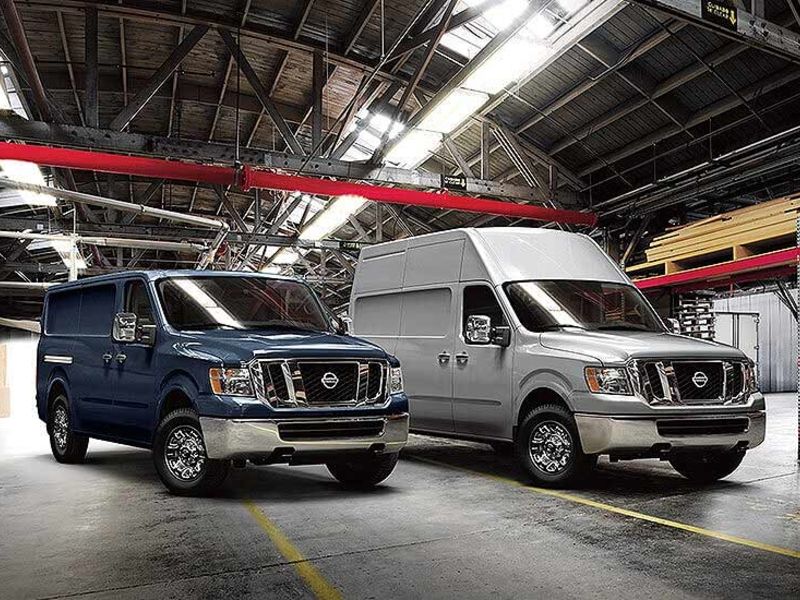
Nissan is shifting strategy on commercial vehicle sales now that it is pulling the plug on work vans.
The automaker confirmed Friday that it will end production of full-size NV cargo and passenger vans in Canton, Miss., and the compact NV200 van in Cuernavaca, Mexico, next summer. Automotive News reported those plans in June.
With the end of van sales in the U.S. and Canada, Nissan says it will continue pursuing commercial vehicle deliveries by pitching sedans and crossovers to fleet buyers and small businesses.
Jennifer Moser, Nissan North America’s director of fleet sales, said the small-business market is an opportunity to drive additional sales and bring new customers to the Nissan brand.
“We want to attract small businesses to our dealer showrooms so they consider Nissan as part of their vehicle acquisitions,” Moser said.
On Oct. 16, Nissan will launch a Business Advantage Program, marketing the brand’s full model lineup — except for the limited-production GT-R sports car — to fleets and business owners.
Nissan’s previous commercial program was limited to Nissan’s NV vans and the Titan and Frontier pickups.
Nissan sold 38,790 NV and NV200 vans in the U.S. last year, less than one-sixth of the 240,529 vans Ford sold.
Commercial vans represented only incremental business for Nissan, said Michael Colleran, Nissan North America’s sales boss.
“We see much more opportunity to shift our focus to our core sedans, crossovers and trucks, especially given the trends in commercial vehicle purchases,” Colleran said.
The NV vans were popular with plumbers and carpet cleaners. But despite a decade-long effort, Nissan could not loosen the Detroit 3’s grip on the commercial van business.
Last year, Ford cornered 48.6 percent of the large-van segment, while General Motors held 24.9 percent, according to the Automotive News Data Center. Nissan had a 4.9 percent share.
Low sales of the Titan pickup haven’t helped. Commercial customers often prefer to purchase their vans and pickups from the same source. But lacking the breadth of pickup variants and configurations that the Detroit 3 offer, Nissan struggled to win over buyers of van fleets.
“Chevrolet and Ford can be everything to everybody,” said Tyler Slade, operating partner at Tim Dahle Nissan Southtowne in suburban Salt Lake City. “When we went to some of these fleet companies, it didn’t make sense for them to have trucks from Ford and vans from Nissan.”
Vehicles across the Nissan product portfolio are already being purchased for commercial purposes, Moser said.
“Home health care workers like to drive Sentra, insurance agents love to drive Altima, pharmaceutical reps love to drive Rogue and Murano,” she said.
The Business Advantage Program will offer volume discounts, commercial financing and perks such as priority service. It will require a minimum two-vehicle purchase to quality for volume-based incentives.
Nissan’s commercial business previously required customers to order at least five vehicles to qualify for fleetail incentives.
The expanded approach is timed to the brand’s product offensive. Nissan will bring six new or updated vehicles to dealerships by the end of 2021.
Moser said many of the updated models, including the redesigned Rogue compact crossover and Sentra sedan, will be well received by the small-business market.
“Those segments do very well from a volume perspective in the commercial segment,” she said. “Sedans are certainly an advantage for us that we want to market commercially.”
Nissan’s exit from the van business will have ramifications for many of the brand’s dealers. About a fourth of Nissan’s 1,074 U.S. dealers made the necessary store investments to enter the commercial vehicle business in 2011, installing heavy-duty lifts capable of raising 30,000 pounds of loaded vans, extending business hours to accommodate contractor needs and hiring a sales staff dedicated to fleet issues.
Those dealers are going to have to reallocate capital and personnel to find replacement business for lost van sales, Nissan National Dealer Advisory Board Chairman Scott Smith said.
“They are going to have to reinvent themselves,” he said. “It’s unfortunate.”